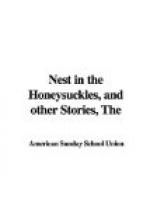The old robins stood on one of the branches of the walnut-tree, and endeavoured to persuade their timid brood to come to them. They were not stern and severe, for they had not forgotten their own youth, and they sympathized deeply with these children; but the father found he must be decided, so he told them, (as it seemed,) authoritatively, that they must hesitate no longer. He would count one—two—three; and when he said three, they must spread their wings and do as well as they could. The mother smiled lovingly upon them, and they determined to obey, whatever effort it might cost. “One—two—three,” counted the robin, in his full, musical tones. The birdlings fluttered their wings, and strained every nerve to alight by the side of their parents. With what joy they felt their feet clinging round the branch! How elated they were with their success! They chirped continually, and merry and brisk was the conversation. “What is this?” one asked, and “What is that?” said another, till it seemed as if the old birds would be weary of their questions; but they never lost their patience; they thought the little folks remarkably intelligent.
When they were rested, away flew the birds to the elm, and called to their young. Grown courageous by success, they quickly followed, and, through the whole day, they were flying about from tree to tree, enjoying themselves highly.
At sunset, I saw them on the locust-tree, near the cottage, inhaling its delicious perfume, with their faces toward the west, wondering, perhaps, what occasioned all that glorious beauty, as the sun escaped from their view.
Presently they flew to a great cherry-tree, and, from the chirping and calling, we concluded they spent the night in its shelter. How strange it must have been to them, this first night of their perching! The sky was clear, the stars twinkled, and the half-moon shed her silvery light on the earth, and gleamed through the cherry-leaves, as it had done through the honeysuckles; but it was not home, that cherry-tree, and they sighed as they thought of their birthplace. They sat close to their mother’s side, and felt that, after all, where she was, was the best place for them. They curled up one foot into the soft down, and turned back their heads till their bills were beneath their wings. The lids slowly closed over their eyes, and they slept quietly and sweetly, till wakened in the morning by the warbling of songsters who welcomed the rosy dawn.
A new sense of responsibility filled their hearts. They were no longer mere children, their every want supplied by others; but they were youth, and must begin to provide for themselves, and depend upon their own energies. We frequently hear the young robins among the trees, but we seldom see them. We really miss them, and think of them as pleasant visitors who have been spending a few days with us.
We hope that Honeysuckleville will not be forsaken; but that every year the birds will return, and rear their young beneath its fragrant shade, making hearts of the little Dudleys glad, and teaching them to love.




